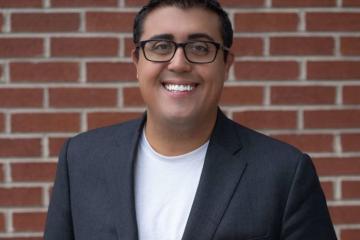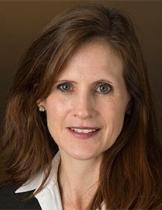
Researcher Spotlight: Alicia Sasser Modestino on boosting youth employment through trust and partnership
In this Evidence Champion series, J-PAL North America is recognizing individuals in our network who have made extraordinary contributions to the field of evidence-based policymaking. This piece features the work of Alicia Sasser Modestino, our 2024 researcher recipient whose policy interests include youth development, health care, housing, and migration. Alicia is an Associate Professor in the School of Public Policy and Urban Affairs and the Department of Economics at Northeastern University and the Executive Director of the Community to Community Impact Engine. This post highlights Alicia’s commitment to building trust, her long-standing collaboration with the City of Boston, and her focus on fostering equity in the field of economics.
Building trust to cultivate strong research partnerships
Alicia’s research spans multiple sectors, from health care to workforce development, giving her a breadth of experience engaging with a variety of partners. One through line in all of these diverse partnerships? The importance of building trust to enable a collaborative research environment. Her approach to research centers on the engage-think-do model, emphasizing the importance of close and constant collaboration from start to finish. This engagement model enables researchers to go beyond estimating a program’s impact—it equips the partner to act on the results and continuously improve their program.
Alicia implements this approach in her research partnerships, encouraging transparency and fostering a space for collaboration, sharing insights, and co-creating solutions. This strategy is exemplified by her work with the City of Boston evaluating their summer youth employment programs. Alicia and her city contacts at the Office of Workforce Development practice regular communication through recurrent meetings to ensure ongoing project alignment and trust. Alicia reflects “we are moving at the speed of trust. If you are trying to develop an intervention with an organization, [you need to] understand that you are working with their constituents, their participants, their young people, their communities, which takes a lot of trust.”
Recognizing the value of the engage-think-do model, Northeastern University made a 4.5 million dollar investment in Alicia’s work for the Community to Community Impact Engine initiative in 2022. This investment focuses on using data and analysis to evaluate innovative public policies, while allowing researchers to dedicate the time and resources needed to develop relationships with their policy partners before beginning evaluations. Jenny Irons, Senior Program Officer from the William T. Grant Foundation, shares “in collaboration with her partners, Alicia has built a model of mutually beneficial, rigorous partnership research, a model she is sharing with others through Community to Community: Policy Equity for All.”
Evidence to policy for summer youth employment programs
Alicia has dedicated over a decade to supporting Boston’s Summer Youth Employment Program (SYEP) by conducting randomized evaluations to better understand their impacts on young people. Specifically, randomized evaluations have been effective at disentangling the changes in youth outcomes attributable to the program from those that simply stem from natural youth development.
Her research showed that youth who participated in Boston’s SYEP had reduced involvement with the criminal legal system, increased school attendance and graduation rates, and led to higher levels of community involvement, college aspirations, and job readiness skills compared to their peers who did not participate. In 2020, while other programs were halting operations due to the Covid-19 pandemic, Alicia’s findings informed Mayor Walsh’s decision to further invest 4.1 million dollars into SYEP to sustain and grow youth employment opportunities in Boston. Her research on SYEP also led to the City of Boston investing 18.7 million dollars in summer jobs in 2023, successfully employing over 9,000 young people, and has now expanded into Mayor Wu’s decision to establish a Mayor's Youth Job Guarantee in 2024 that ensures all Boston Public School students job opportunities. In response to these milestones, Alicia reflects, “I’ve always said that my greatest achievement would be putting myself out of business, meaning we could no longer randomly assign jobs, and I’ve just done it.” Alicia’s work with the City of Boston to guarantee summer jobs for its students demonstrates how providing evidence-based insights can not only inform, but transform public programs.

Fostering equity in research and economics by focusing on real-world impacts
Alicia’s passion for research extends beyond academic accolades—it is driven by a desire to catalyze real-world change. For Alicia, research should be a tool for guiding policy and improving people’s lives. When she first began working on SYEP research, youth employment wasn’t a priority for many policymakers. Yet, through a decade of continuous research, Alicia has helped elevate SYEP to be one of Boston’s top public policy priorities. Jared Auclair from Northeastern University shares “Alicia has consistently bridged the gap between academic research and practical policy making. Her work on youth employment, particularly, has underscored the importance of economic opportunity for young people and the cascading effects it has on community well-being. Through her research, she’s provided policymakers with critical insights that underscore the importance of investing in programs that support young people at a pivotal time in their lives.”
Alicia is driven by a broader vision of shifting economics and policy research toward inclusivity. Focusing on economics issues that affect people's well being not only increases the evidence base, but also elevates the contributions of the researchers who do this work—which is most often women and people of color—creating a more inclusive field. Beyond calling on researchers to study the issues most relevant to people’s well-being, Alicia also emphasizes the importance of bringing humility into research partnerships and recognizing the value of lived experience.
Committing to real-world impact has not only allowed Alicia to see her research influence public policy—she’s also seen the direct impact SYEP has made on individuals through chance encounters and interactions. Alicia shares: “One of the great joys of working on SYEP is that almost every time that I go to present my research somewhere, there's an SYEP kid somewhere in the room. At Northeastern, when we used paper surveys, I had a lot of undergraduates who would support data entry and analysis. One year it came full circle—one of my students had been a summer jobs participant in Boston and was now working on evaluating the program. And I find that everywhere—it’s incredibly gratifying.”
Acknowledgments
Alicia would like to thank the broad team of researchers, policymakers, practitioners, and community members who are partnering with her to make this work possible:
- City of Boston: Trinh Nguyen, Rashad Cope, Katy Gall, Sarah Saroui, Allison Vernerey, Adeola Ebekozien, Samantha Bhatnagar
- Boston Summer Jobs Ecosystem: Action for Boston Community Development (Jessica Rosario), Boston Private Industry Council (Joseph McLaughlin), John Hancock MLK Scholars Program (Annie Duong Turner), State Street (Midori Morikawa), Youth Options Unlimited (Mallory Jones)
- Boston Public Schools: Catherine Chiu, Marsha Innis Mitchell, Michelle Sylvaria
- Community to Community Impact Accelerator, Northeastern University: Lynn Sanders, Alli Chagi-Star, Kat Stecher, Ellie White, Hanna Hoover, Aria Golestani, Josh Lown, Hitanshu Pandit, Peiran Cheng, Joseph Koroma, Eric Bell, Sophia Sawyers, Samara Shankar
- Department of Economics, Northeastern University: Mindy Marks, Urbashee Paul, Richard Paulsen, Rachel Sederberg
- J-PAL North America: Kim Dadisman, Kalila Jackson-Spieker, Yiping Li, Sara van Nes
- Funders: William T. Grant Foundation; Spencer Foundation; American Institutes for Research; Doris Duke Foundation; Bezos Foundation; Arnold Ventures; Federal Reserve Bank of Boston; Third Sector Partners
- Other Research Collaborators: Anthony Braga (University of Pennsylvania), Pieta Blakely (Blakely Consulting), Agapi Koulouris (Massachusetts Department of Criminal Justice Information Services), Laura Lempicki (Massachusetts Probation Service), Elana McDermott (Massachusetts Department of Elementary and Secondary Education), Martha Ross (Brookings Institution), Ben Struhl (University of Pennsylvania), Brandon Turchan (Michigan State University)
Related Content

Partner Spotlight: How AJ Gutierrez is increasing educational equity through collaboration and evaluation

Affiliate Spotlight: Gustavo J. Bobonis on advancing evidence generation and use in Puerto Rico


